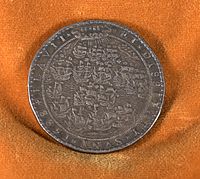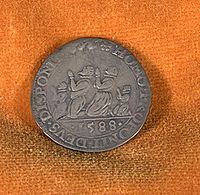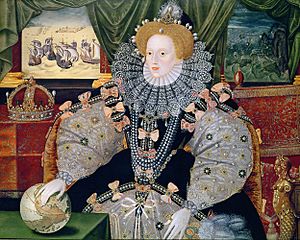He blew with His winds, and they were scattered facts for kids
He blew with His winds, and they were scattered (in Latin: Flavit et Dissipati Sunt) is a famous phrase. It was used after the Spanish Armada was defeated in 1588. The Armada was a huge Spanish fleet. A big storm broke up many of their ships. This storm was also called the Protestant Wind. The phrase likely came from words written on special medals made to celebrate this big event.
Why the Armada Sailed: A Big Conflict
The fight between Spain and England was also about religion. Catholic Spain and Protestant England had not been getting along for a long time. This led to the Anglo-Spanish War starting in 1585.
England had been helping the Dutch Protestants in the Eighty Years' War. The Dutch were fighting against Spanish rule. To stop England from helping, Philip II of Spain decided to invade England. In 1587, the Pope gave him permission to remove Queen Elizabeth I from her throne. She had been removed from the Catholic Church by an earlier Pope.
Spain prepared a huge fleet called an Armada. This Spanish word means "battle fleet." The plan was to invade England, defeat its army, and remove Queen Elizabeth. The Armada had about 130 ships, 8,000 sailors, and 18,000 soldiers. It also carried many cannons. Spain was one of the richest and most powerful countries in the world then. England was much weaker. Also, since Elizabeth became Queen, England was Protestant and did not have many strong allies in Europe.
How the Armada Was Defeated
The English fleet fought the Armada. English admirals like Lord Howard of Effingham, Sir John Hawkins, and Sir Francis Drake led the English ships. The Armada could not meet up with the Spanish army waiting in the Netherlands. So, they had to sail north around the east coast of Britain. They tried to go home by sailing around Scotland and Ireland.
Here, the ships faced very rough seas and a huge storm. This storm was one of the strongest ever recorded so far north. The Spanish ships were already in bad shape from being at sea for a long time. Many ships sank. Others were pushed onto the Irish coast and wrecked. Over 50 ships were lost. The Armada was no longer a strong fighting force. The ships that made it back to Spain were damaged. Their crews were sick and weak from the long journey.
After the Battle: A Divine Victory?
King Philip's plan to invade England had failed. The bad weather played a very big part. A story says he later declared, "I sent my ships to fight against the English, not against the elements."
People across Europe saw this conflict as a battle between Catholicism and Protestantism. The English saw their unexpected victory as proof that God supported their Protestant cause. They held church services all over the country to give thanks. Many medals were made in England and the Dutch Republic to remember the event.
One famous medal from the Dutch Republic had the Latin words Flavit Jehovah et Dissipati Sunt. This means "Jehovah blew and they were scattered." It showed ships in a stormy sea. The other side of the medal showed a church building. This church stood strong in a storm, representing the Protestant Church surviving the Armada's attack. The words on this side meant "I am assailed but not injured."
Other medals also showed sinking ships or people praying. Some used the Latin phrase Flavit Deus et Dissipati Sunt, meaning "God blew and they were scattered."
Queen Elizabeth is believed to have given medals to her admirals with this phrase. The term "The Protestant Wind" is also sometimes used. It also highlights the idea that God helped the English win.
This phrase, along with Elizabeth's speech to her troops at Tilbury, became a famous part of the story. It is like how "England expects that every man will do his duty" became famous after the Battle of Trafalgar. Shorter versions of the phrase are also used, such as "God blew and they were scattered."
 | Bessie Coleman |
 | Spann Watson |
 | Jill E. Brown |
 | Sherman W. White |




